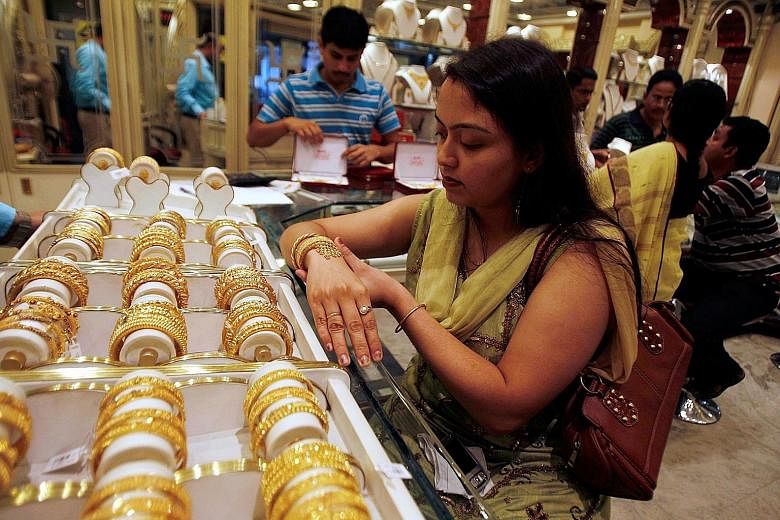MUMBAI • A self-imposed cash shortage in India is creating chaos for jewellery retailers in one of the world's biggest gold-buying countries. Sales are plunging.
Just ask marketing consultant Renita Ferreira. While her Feb 24 marriage ceremony has been set for a year, she and her fiance have not bought their wedding rings, even after many trips to stores in Panaji, the capital of Goa state.
Most retailers are not equipped to accept credit cards because India's jewellery industry runs mostly on cash, something consumers have a lot less of these days.
Last November, the government banned what amounted to half the circulated cash, part of a plan to curb corruption and tax evasion. The move cut purchases of everything from cars to soap in a country where 98 per cent of consumer payments are in rupee notes.
While a replacement currency was issued, the disruption further eroded gold demand already slowed by higher retail costs. "All our plans went for a toss after the demonetisation," said Ms Ferreira, 28. "Cash is just not an option. We can't get married without rings."
Gold demand in India, which trails only that in China, likely tumbled to a seven-year low last year, according to the World Gold Council, which has cut its forecasts twice. The council pegged consumption at 650 to 750 tonnes, down as much as 24 per cent from 858.1 tonnes in 2015.
-
WHY INDIANS ARE BUYING LESS GOLD
• Cash shortage caused by government's demonetisation move
• Most Indian gold retailers do not accept credit cards
• Weak monsoon season lowers income from farms
• Higher taxes from 2013 on imported bullion
The fall will continue this year, based on slowing imports that account for much of what the country buys, said Kotak Mahindra Bank. Purchases of foreign bullion will be 350 to 400 tonnes, down from 575 tonnes last year, the bank said.
Indians were already buying less gold before Prime Minister Narendra Modi enacted the world's most sweeping currency policy change in decades. Higher prices had kept many consumers away, and rural demand fell off when a weak monsoon season eroded farm income.
Also, jewellers went on strike to protest against an excise tax on locally made jewellery and the government's push for greater transparency in the financial system.
Conditions for bullion weakened further after the government invalidated old 500- and 1,000-rupee notes, akin to the United States withdrawing all currency except half of its US$1 bills. The goal was to combat black market transactions that are a big part of India's retail economy.
Millions of people lined up at banks to deposit notes or exchange them for notes of new denominations. But curbs remain on how much cash they can withdraw, even at ATMs. Rural residents were hurt the most because they use cash almost exclusively.
Gold's prospects in India may only get worse this year, said head of global transaction services and precious metals Shekhar Bhandari at Kotak Mahindra Bank in Mumbai.
While the reforms will aid the domestic banking system, investors probably will put money in other wealth management products rather than bullion, he said.
The India Bullion and Jewellers Association estimates it may take at least six months for the market to get back to normal, though demand usually slows in the monsoon months from June to August.
That means purchases may not pick up until the end of the year, during the festival season.
"People have reduced their spending power, and they are more concerned with having enough money to buy essential items," according to the association's joint secretary Ketan Shroff.
Mr Modi's reforms may further erode demand by discouraging investors who used gold to keep their wealth off the government's radar. "One of gold's qualities that attracted so many consumers in India is its lack of traceability," said commodities economist Simona Gambarini at Capital Economics in London.
"The government knows that, and in order to be successful in tackling illegal money, it will need to increase the transparency in the gold market."
BLOOMBERG

